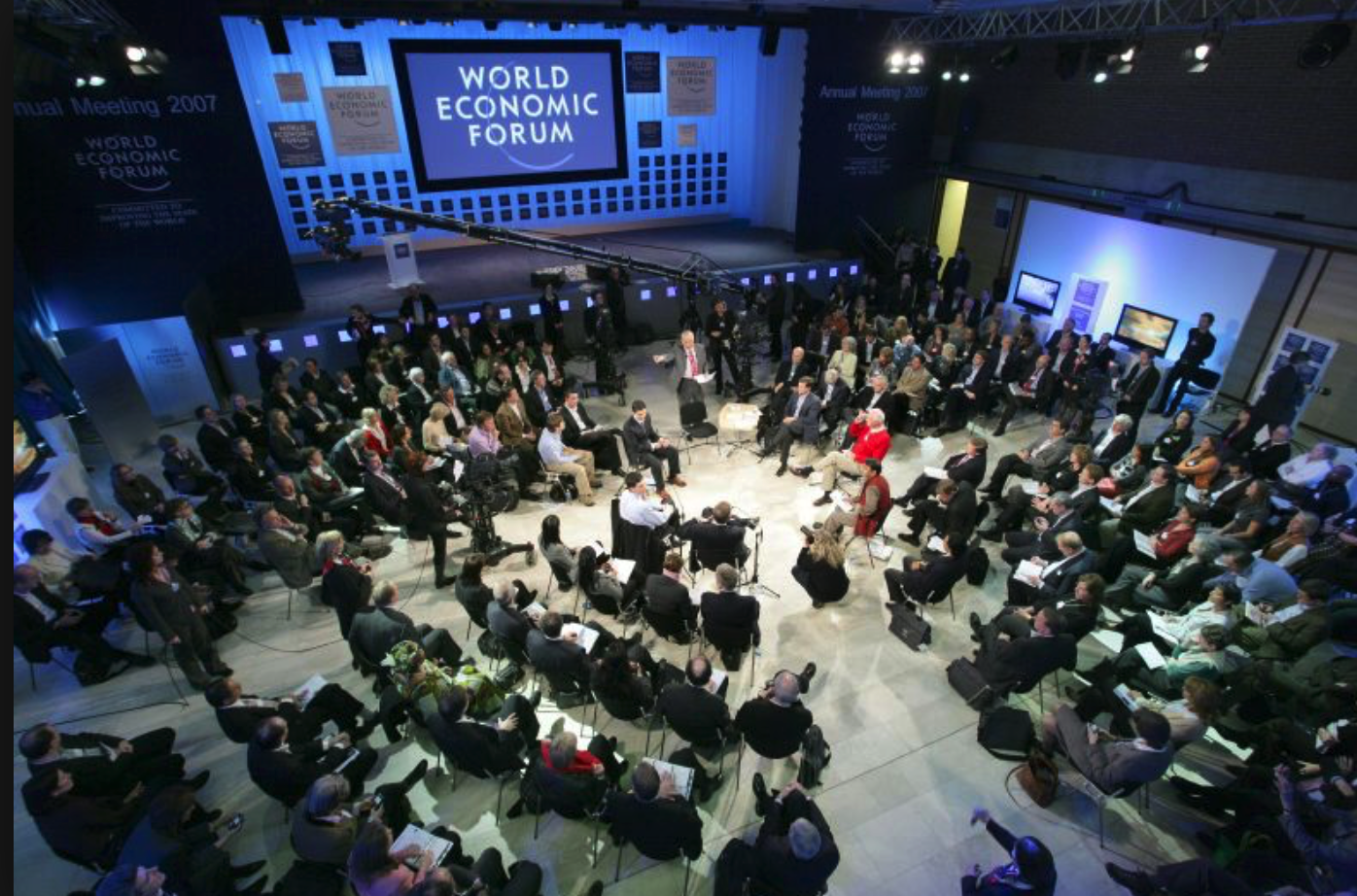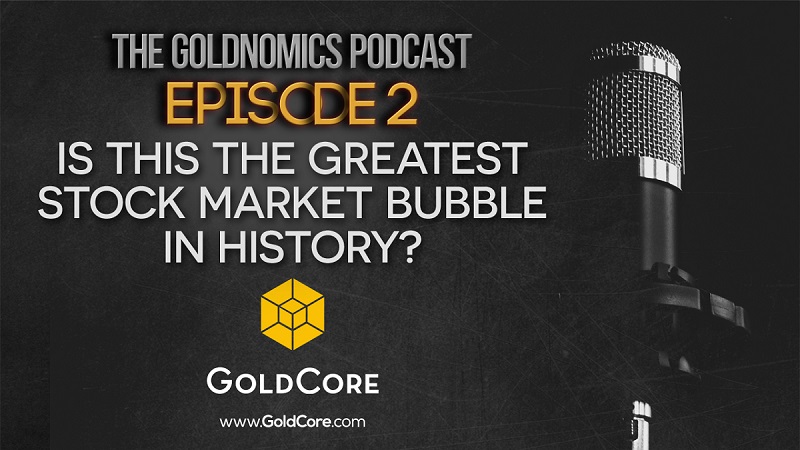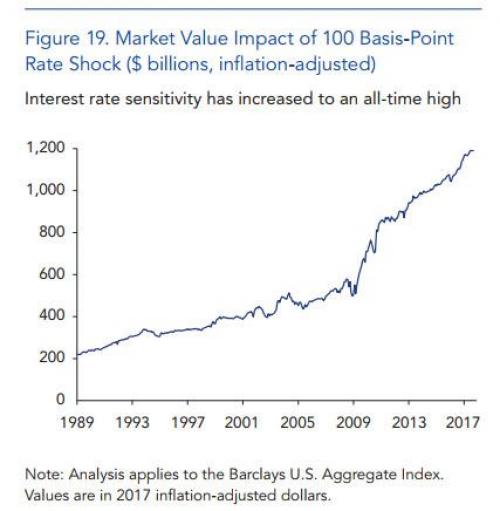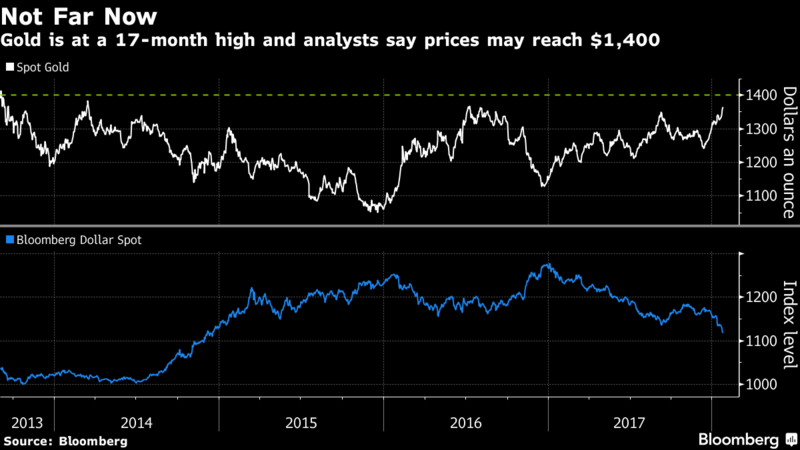– Davos elite hear warnings of complacency akin to 2007 as economic risks grow
– Toxic mix of infallible belief, arrogance, megalomania and economic ignorance
– Some express concern economies are vulnerable due to imbalances, trade, geo-political tensions
– Soros: Trump creating ‘mafia state’ & ‘set on a course towards nuclear war’ with N Korea
– Bond bear market, rising interest rates and massive $233 trillion debt are some of the many threats to global stability
– Davos theme explores massive inequality across the globe while eating $60 hamburgers
– Thousand private jets fly as some attendees lecture poor and middle classes about their fossil fuel consumption
– Blockchain has potential to revolutionise the world of money and foster equality – if not co-opted by elites
– Better spending $100,000 on physical gold stored in vault in Switzerland then $100k to attend Davos
By Jan Skoyles. Editor Mark O’Byrne
Two years ago I was fortunate enough to be invited to the World Economic Forum at Davos. The invite and events were paid for but everything else was not. This gave me an interesting insight into how the other half (read: 1%) live whilst not enjoying all the spoils of the forum.
Davos for 51 weeks of the year is a fairly bog-standard Swiss ski resort, no more special than others in the surrounding areas. But when the World Economic Forum and world’s elites are in town a normal hotel room suddenly costs $500 and you have to hand over $60 for a hamburger.
Needless to say I found myself a hotel room an hour’s drive away from Davos and stocked up at the hotel breakfast.
We hired ourselves a little Vauxhall Astra and set-off for Davos each day. On the drive into Davos you are pulled over at various check-points by armed police who are clearly wondering why someone in their ski gear (it’s the only warm thing I own) and a tiny rental is heading in that direction. You have to prove that you have a access to the WEF events whilst passport and your car are checked to ensure you’re not going to disrupt the air of calm and power.
The cost of securing Davos is reportedly over $9 million. The whole time you are proving that you are not a security threat multiple helicopters are passing over head bringing those that the armed men are protecting, straight into the heart of the mountain village. Here shops have been converted into hubs by big banks and tech companies looking to host the global elite and black town-cars wait in disabled bays for their clients to finish the latest ground-breaking speech or key meeting.

Davos elite jet into Davos while lecturing humanity to cut down on fossil fuel.
Source: Twitter via Europa Guardian (@EuGu_) January 21, 2018
The cost of admission to Davos is made up of the membership fee (over $50,000) and the actual annual ticket (around $20,000). Of course the majority of individuals attending are not covering these costs (or any other costs during the week), they are politicians, wealthy business men and other poweful people hosted by large corporates looking to curry favour.
The 48th Forum of Davos is running under the theme of “Creating a Shared Future in a Fractured World”.
The people who regularly attend Davos are certainly good at talking about those who will never even hear about Davos, let alone attend themselves. But it is tricky to imagine how a group of people who don’t blink at a free ticket worth nearly $100,000 (taking sundries into account) are able to relate to the mass of humanity who have so little.
This is a common criticism of Davos. This year, particular heed should be taken. At the start of the week bank CEOs, Nobel prize wining economists and top investors expressed concern that markets were too complacent about the current state of play. Whilst many market signals suggest we are well-past the financial crisis, cracks are beginning to show. Indeed there are growing signs of “irrational exuberance” and bubbles in stock markets as explored in our podcast released yesterday.
These levels of complacency have not been seen since 2007, about the time that Roubini, Shiller, GoldCore (trading as Gold and Silver Investments Limited) and a few others were shouting for everyone to wake up. Indeed, we at GoldCore began warning about surging debt levels and the risk of a financial crisis in 2005.
The global elite should pay attention to this given the theme of the year. Since the financial crisis we have seen the number of billionaires more than double. We are also in the worst period of inequality since 1820, according to the OECD. This is disturbing, particularly for those at Davos flying the flag for globalisation, reduced protectionism and increased trade.
“We are seeing a paradox of high returns and high anxiety,” BlackRock chief exec Larry Fink wrote in his annual letter to the heads of the world’s biggest companies. “Since the financial crisis, those with capital have reaped enormous benefits. At the same time, many individuals across the world are facing a combination of low rates, low wage growth, and inadequate retirement systems.”
As Bank of England Chief economist Anthony Haldane reminds us, this is bad news for the Davos Few, there is rising evidence that extreme inequality harms, durably and significantly, the stability of the financial system and growth in the economy.”
Yet, where is the incentive to pay attention? Stock and bond markets are at record highs (as are property markets where most billionaires reside), corporate taxes in the United States and Britain are falling, and every major economy is performing well – superficially at least. Billionaires and leaders of the West have very little to complain about.
But they must. The financial system can no longer afford to be celebrated whilst simultaneously ignoring the many imbalances and risks. Many are now warning against complacency and urging us to learn the lessons of the past and from financial history – distant and more recent. Of particular concern this year is the rise in populism and how this may hinder attempts to avoid another financial disaster and may create a geo-political disaster in the form of a World War.
Bond bear market is underway
As we discussed earlier this week, the bond bear market has been signalled by Bill Gross. He has now been joined by Bridgewater’s Ray Dalio who has warned that a rise in yields could spark the biggest crisis for fixed-income investors in almost 40 years. He confirmed that we are now in a bond bear market, that could get worse.
This isn’t the first time Dalio has expressed such a concern about the bond market, Zerohedge were quick to remind us:
Readers may recall that when addressing the NY Fed in October 2016, Dalio made virtually the same prediction when he commented on the bond market’s DV01:
… it would only take a 100 basis point rise in Treasury bond yields to trigger the worst price decline in bonds since the 1981 bond market crash. And since those interest rates are embedded in the pricing of all investment assets, that would send them all much lower.
Dalio is referring to the record DV01 in the bond market, which according to the latest OFR report released in December, has risen to $1.2 trillion: that’s the P&L loss from a 100bps rise in rates.
The watchdog found that “valuations are also elevated” in bond markets. Of particular interest is the OFR’s discussion on duration. Picking up where we left off in June 2016, and calculates that “at current duration levels, a 1 percentage point increase in interest rates would lead to a decline of almost $1.2 trillion in the securities underlying the index.”
The following includes excerpts from a Bloomberg article highlighting the key concerns from some of the Davos attendees this year.
One of the most interesting was Jes Staley, CEO of Barclays expressing concern that we are returning to 2006:
“I do feel it’s a little bit like 2006, when we were all talking whether we’ve solved the riddle of economic crises.”
CHINA
The world’s second-largest economy surprised on the upside through 2017, but is beginning to show renewed signs of cooling. A plan to reduce risk in the financial system has slowed credit growth, but the country’s debt pile, equivalent to about 264 percent of gross domestic product in 2017, remains a concern.
How the Chinese authorities rein in borrowing without tipping the economy over will be one of the year’s biggest challenges.
“I think of China as probably being the epicenter if we got hit by a global recession,” said Rogoff.
GLOBAL DEBT
It’s not just China. Global debt rose to a record $233 trillion in the third quarter of 2017, more than $16 trillion higher from the end of 2016, according to the Institute of International Finance. Private non-financial sector debt hit all-time highs in Canada, France, Hong Kong, South Korea, Switzerland and Turkey.
As interest rates begin to increase, borrowers might start to feel pain even though the ratio of debt-to-GDP has fallen as growth accelerated.
“We’ve seen the world leverage up,” said Tim Adams, the institute’s president who will be in Davos. “It’s been an incredibly low rate environment which I suspect is going to change.”
INTEREST RATES
The trigger for the end to that environment could be an inflationary surge that forces central banks to dump their piecemeal approach to reversing the emergency stimulus of the past decade.
Staley believes we’re currently in a depression-era style system:
We’ve got a monetary policy that’s still in the remnants of the depression era. We’ve got very little capacity in the capital markets to deal with a real move in interest rates.”
The Bloomberg article goes onto say:
With economies expanding so quickly, commodities prices are picking up and manufacturing gauges are pointing to supply constraints. The U.S. also just slashed taxes, and some big employers, like Walmart Inc., are beginning to lift wages.
“We could start to see inflation rising more than most people think in financial markets which means the Fed and other central banks will have to raise rates sooner and faster,” said Nariman Behravesh, chief economist at IHS Markit. “That could rattle things up.”
Anne Richards, chief executive of M&G Investments, also told Bloomberg separately about her concerns for potential for higher interest rates. “If interest rates go up meaningfully over the next 12 months, there will be a bunch of people who have borrowed money who will not be able to pay it back,” she said. “Those people are out there, and the markets are not, in aggregate, pricing that.”
Rogoff said the “biggest vulnerability” in markets would be a sudden reversal in the trend toward lower inflation-adjusted borrowing costs.
Rogoff also stated:
“If interest rates go up even modestly, halfway to their normal level, you will see a collapse in the stock market…I don’t know how everything from art and bitcoin to stock prices will react as interest rates go up.”
The Doom-sayers of Davos
Bloomberg also highlights the dangerous collision course that economics and politics are currently on. Sadly, many politicians believe they can manage one without considering the other. Economists are also guilty of this.
But with North Korea affecting sanctions, Brexit as uncertain as ever and Trump’s populist approach driving down the US dollar, there is little that can be ignored.
For all of the geopolitical risks considered below, leaders saw the risks rising:
Blockchain is forcing a wake-up call
Now this year they are being forced to consider how these geopolitical risks are affecting the many who have so little.
One of the main areas being discussed is the role of blockchain, the very technology that first grabbed the world’s attention because of bitcoin’s desire to operate beyond the world of the bankers and monetary and political elites.
Blockchain is the reason I was at Davos. The theme that year was ‘The Fourth Industrial Revolution’, possibly one of the more forward thinking and interesting topics we’ve seen.
There was a lot of chat about blockchain but a lot more about the dangers of bitcoin. Now both are being seen as a threat, and blockchain also as an opportunity.
Most of the world’s elites, from bank CEOs to central bankers refuse to touch bitcoin. The recent price activity has (they believe) vindicated their concerns about the asset. However, they are all putting in time and money into blockchain. Safe in the knowledge that it could end up disrupting their whole world.
Blockchain really is the leader of the next tech revolution. It has a huge amount of potential. However, the wheel wasn’t much use until you redesigned how you travelled. The same can be said for blockchain.
Blockchain’s potential will come to nothing if the systems, approach and mindset of the Davos elite does not change. Complacency around financial markets is dangerous. The system is clearly broken but until the elites realise that the current status quo is broken then their is little blockchain can do for them.
Blockchain demands accountability, transparency and validation. Can the Davos few cope with this?
No expensive burger will solve the next financial crisis
My memories of Davos are nothing like those of the elite.
No $60 burger passed my lips and I was forced to park in the supermarket rather than have a chauffeur pull-up and rescue me from the bitter cold. I was only given access to satellite events, not the main forum yet even there there was an air of arrogance that we could all fix the world’s problems.
My main takeaway is I’m unsure of the efficiencies achieved in a mountain resort that (at some points) was minus 18 degrees centigrade, takes a real effort to get to and is (financially, geographically and culturally) a world away from the main issues of the day.
This is where my concerns lie. We have not solved the financial crisis that was ultimately borne out of total hedonism, greed, infallibile belief, arrogance and economic ignorance. Yet here we see 2,500 global elite (including 70 heads of state and government) at an event, the cost to attend is well in excess of the average global citizen’s annual wage.
Whilst our leaders and great minds sit pretty in the snowy mountains of Switzerland we can be working to protect ourselves. Let’s be honest 48 years of Davos has not brought a huge amount of benefits to our day-to-day lives. Instead we have been forced to take charge of our finances and protect ourselves from the system.
Physical gold, that is allocated and segregated may well be stored in Switzerland but it cannot be debased or confiscated by the monetary elites. As they work to make the world more connected, more digital and at risk then our cash in the bank and digital assets in our online world are becoming increasingly vulnerable.
Ignore the noise coming out of Davos and focus on what we can control – earn more than we spend, diversify our assets, save with safe counter parties and protect our wealth with the insurance gold.
$100,000 worth of physical gold coins and bars stored in a vault a few miles from Davos is important financial insurance and it only costs the same amount as attending Davos!
Related reading
Government Shutdown Ends – Markets Ignore Looming Debt and Bond Market Threat
Is New Fed Chief A “Swamp Critter Extraordinaire”?
Protect Your Savings With Gold: ECB Propose End To Deposit Protection
News and Commentary
Gold Is Heading Towards a Four-Year High (Bloomberg.com)
Gold inches up after dropping from 1-1/2 year highs (Reuters.com)
Trump says dollar to get ‘stronger and stronger’ (CNBC.com)
ECB keeps policy unchanged, faces questions over euro surge (Reuters.com)
Trump Rallies Dollar as Stocks Wobble, Crude Falls: Markets Wrap (Bloomberg.com)
Davos team propels gold price to 18-month high, Trump shoots it down (Mining.com)
Source: Bloomberg
Is This The Greatest Stock Market Bubble In History? Goldnomics Podcast (GoldCore.com)
DataTrek: The 5 Scenarios That Could Crash The Market, And How To Hedge Them (ZeroHedge.com)
Why We’re Underestimating American Collapse (ZeroHedge.com)
The Dark Side of America’s Rise to Oil Superpower (Bloomberg.com)
Markets Are About to Get Ugly According to These Charts (Bloomberg.com)
Gold Prices (LBMA AM)
26 Jan: USD 1,354.35, GBP 950.21 & EUR 1,087.41 per ounce
25 Jan: USD 1,360.25, GBP 954.35 & EUR 1,095.27 per ounce
24 Jan: USD 1,350.50, GBP 957.50 & EUR 1,093.77 per ounce
23 Jan: USD 1,337.10, GBP 959.10 & EUR 1,091.74 per ounce
22 Jan: USD 1,334.15, GBP 959.12 & EUR 1,087.87 per ounce
19 Jan: USD 1,335.80, GBP 960.17 & EUR 1,087.74 per ounce
Silver Prices (LBMA)
26 Jan: USD 17.40, GBP 12.21 & EUR 13.99 per ounce
25 Jan: USD 17.52, GBP 12.29 & EUR 14.12 per ounce
24 Jan: USD 17.19, GBP 12.16 & EUR 13.93 per ounce
23 Jan: USD 16.98, GBP 12.19 & EUR 13.87 per ounce
22 Jan: USD 17.04, GBP 12.25 & EUR 13.90 per ounce
19 Jan: USD 17.04, GBP 12.27 & EUR 13.89 per ounce
Recent Market Updates
– Is This The Greatest Stock Market Bubble In History? Goldnomics Podcast
– Government Shutdown Ends – Markets Ignore Looming Debt and Bond Market Threat
– Global Pension Ponzi – Carillion Collapse One Of Many To Come
– The Next Great Bull Market in Gold Has Begun – Rickards
– Gold Bullion May Have Room to Run As Chinese New Year Looms
– Digital Gold Flight To Physical Gold Coins and Bars
– Gold and Silver Bullion Are Only “Safe Investments Left” – Stockman
– Silver Prices To Surge – JP Morgan Has Acquired A “Massive Quantity of Physical Silver”
– London Property Crash Looms As Prices Drop To 2 1/2 Year Low
– Gold Bullion Up 1% In Week, Heads For 5th Weekly Gain As Bonds Sell Off
– Gold Prices Rise To $1,326/oz as China U.S. Treasury Buying Report Creates Volatility
– Gold Hits All-Time Highs Priced In Emerging Market Currencies
– World is $233 Trillion In Debt: UK Personal Debt At New Record
– 10 Reasons Why You Should Add To Your Gold Holdings
The post Davos – My Personal Experience of the $100,000 Event, $60 Burgers, Massive Inequality and the Blockchain Revolution appeared first on GoldCore Gold Bullion Dealer.
![]()







Leave A Comment
You must be logged in to post a comment.